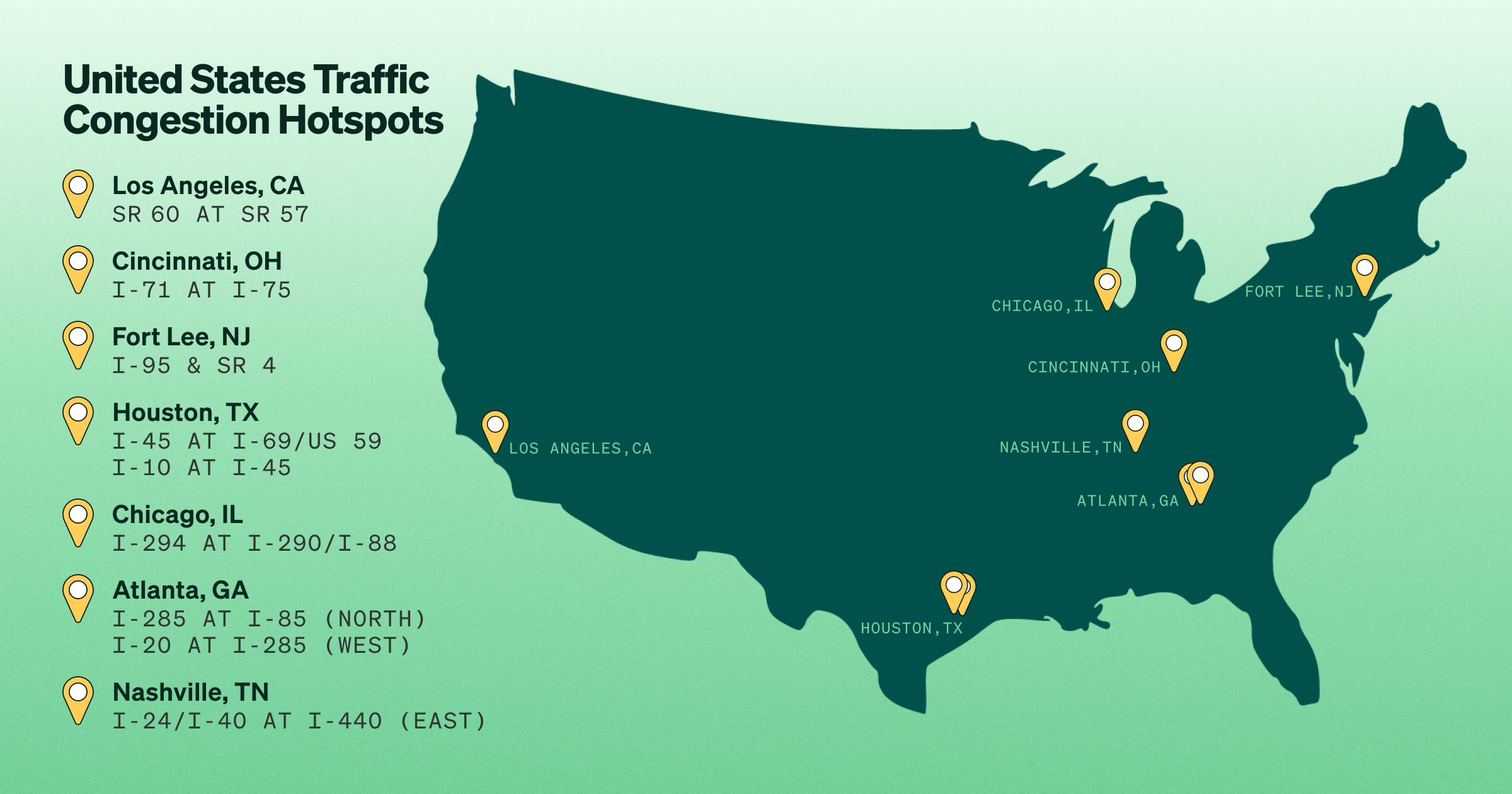The True Cost of Traffic Congestion for Trucking Fleets
Traffic bottlenecks waste time, inflate operating costs and contribute to rising emissions. While data shows that infrastructure investments are improving this issue, it can take time that fleets just don’t have. So, let’s take a wee peek at what fleets can do right now to mitigate the cost of traffic congestion.
Jul 7, 2025
4 min read

Content Overview
This blog breaks down the rising cost of traffic congestion, from $109B in industry-wide impact to lost driver hours, and highlights what actions fleets can take right now to reduce delays and boost ROI.
How Traffic Congestion Impacts Trucking Fleets
Traffic congestion drives up the total cost of ownership (TCO) for trucking fleets by increasing fuel burn, wear and tear on assets and unproductive engine hours. The more time assets spend idling or creeping in traffic, the more maintenance they require over time — which means more downtime. According to the American Transportation Research Institute (ATRI), average truck speeds during rush hour have dropped to 34.2 mph nationwide and just 29.7 mph at the worst chokepoints. Slow speeds = more engine idling = more fuel burn, higher repair frequency and added technician labor.
These delays can also throw off dispatch and force teams to overuse certain assets while underutilizing others, skewing your asset lifecycle planning.
Not to mention that when trucks are stuck, drivers are stuck too. “Delays inflicted on truckers by congestion are the equivalent of 436,000 drivers sitting idle for an entire year,” according to ATRI President and COO Rebecca Brewster. That translates into missed delivery windows and frustrated team members, the latter of which increases turnover risk and contributes to burnout — especially for drivers held accountable for on-time metrics they can’t control.
There’s also the issue of extended idle time. Idle time isn’t just a budget issue — it’s an environmental and compliance concern. Idling contributes to an estimated six billion gallons of fuel wasted annually across U.S. fleets, which can increase your fleet’s carbon footprint and regulatory exposure in regions with stricter emissions mandates.
The Economic Toll: $109 B and Counting
Traffic congestion is one of the most expensive systemic issues facing the trucking industry. $109 billion in annual cost comes from fuel waste, driver time, delayed deliveries, increased asset wear and secondary scheduling issues. These delays can create a domino effect: when one asset is tied up in traffic, repair timelines can shift, technician workflows get delayed and even inspection scheduling can become inconsistent.
ATRI’s Top Truck Bottlenecks report ranks the worst freight chokepoints in the U.S.

If your routes pass through or near these corridors, expect delays, increased maintenance scheduling and potential cost per mile (CPM) spikes. Even if you're not local to these zones, your supply chain likely is.
Trucking fleet optimization is within reach
Skirt some of the cost incursion of traffic congestion by integrating your telematics with Fleetio. Optimize routes, streamline maintenance and improve communication across your fleet. Interested?
Learn moreReal-world Improvements Show Congestion is Fixable
Chicago’s Jane Byrne Interchange is a junction that was once one of the worst in the U.S., but after years of focused investment, noticeable improvements were seen. Truck speeds at rush hour increased by 25%, and the junction dropped significantly in the ATRI rankings, meaning fewer trucks are delayed and fewer downstream supply chain effects are triggered. This is proof that targeted infrastructure fixes work — not just in theory, but in dollars and minutes saved.
Where states have invested in intelligent transportation systems (ITS) and roadway reengineering, they’ve seen double-digit gains in throughput and reductions in collision rates. When cities focus resources based on actual freight patterns, they improve both safety and efficiency. Federal and state-funded projects that focus on truck-heavy corridors tend to produce measurable results, including:
- Fewer collisions
- More consistent arrival times
- Lower fuel and idle costs for fleet operators
It’s a win-win for fleets, drivers and municipalities.
What Fleets can do Today
You may be wondering something like, “How am I supposed to conquer the headache that is traffic?” Or you could be wondering, “What’s for lunch?” While I can’t help with the latter, there are some ways you can mitigate the cost incursion of traffic congestion.
- Use real-time data and traffic overlays to dynamically reroute assets during high-risk windows.
- Adjust routes and schedules by shifting deliveries to off-peak hours or staging trucks closer to high-congestion zones to cut idle time.
- Share congestion data with local trade groups — like Metropolitan Planning Organizations (MPOs) — and chambers of commerce to influence infrastructure priorities.
Traffic congestion is a hidden tax on fleet efficiency. From wasted fuel to strained driver capacity, its effects touch every part of your operation. But tools like ATRI’s bottleneck rankings — and real-world fixes like Chicago’s interchange rebuild — show a clear path forward. By using data to rethink routes, share impact and advocate for better roads, fleets can reduce operational costs and keep drivers moving.
While we’re on the topic of trucking costs…
If you’re looking for key information around the operational costs of trucking based on data provided by the American Transportation Research Institute (ATRI) in their 2024 report update, you might just want to
Click here
Senior Fleet Content Specialist
As a Senior Fleet Content Specialist at Fleetio, Rachael Plant uses her near decade of industry experience to craft practical content aimed at helping fleet professionals tackle everyday challenges with confidence.
LinkedIn|View articles by Rachael PlantReady to get started?
Join thousands of satisfied customers using Fleetio
Questions? Call us at 1-800-975-5304

